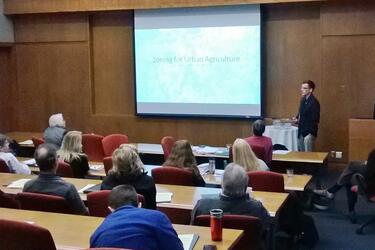MPA student presents
December 10, 2015

December 10, 2015
Can tomatoes and cabbages be grown in your front yard? Can edible vegetation exceed the maximum height permitted by your city’s zoning code? Are honey bee boxes welcome in your community?
Ethan Harris, current MPA graduate student and intern for the Clark County Community Development Planning, recently presented with a team of other public administrators from the Miami Valley on how zoning can be used to increase locally-sourced food and combat hunger in the region at the 29th Annual Miami Valley Planning and Zoning Workshop.
The workshop is a day-long event that brings together planners and
Finding the right college means finding the right fit. See all that the College of Liberal Arts has to offer by visiting campus.